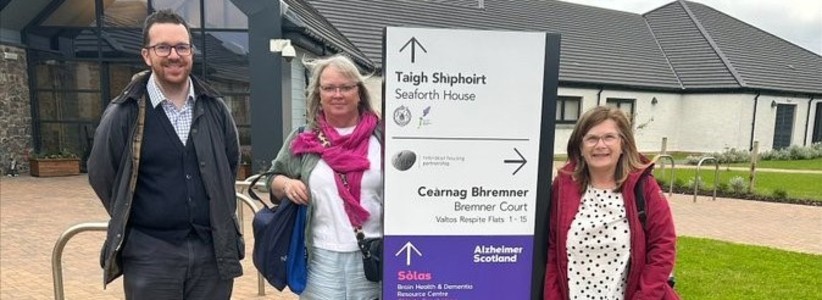Neuroprogressive and Dementia Network reflect on learnings from Highlands and Islands engagement trip

Leading members of the NHS Research Scotland Neuroprogressive and Dementia Network (NRS NDN) Network have reflected on their ongoing efforts to engage with, and learn from, some of the country’s most rural and remote populations
Network Champion Dr Tom Russ, Network Manager Jacqui Kerr, and Strategic Manager Dr Emma Law recently visited the Highlands and Islands, following a successful NRS NDN visit to Shetland last year.
The Network recognises that the people who participate in their trials are not typically representative of the wider population, and that in-person rural engagement can help to address that need for greater diversity in research.
NRS NDN believes that the Highlands and Islands of Scotland face significant challenges. There are an estimated 6,500 people living with dementia in the region and disproportionately high numbers of people with Multiple Sclerosis (MS), in particular.
The remoteness of the area adds to the challenges, exacerbating issues such as social isolation, access to specialist healthcare, availability of support services, and participation in research, the Network notes.
Tom said: “There are a variety of under-served groups when it comes to research participation and a very important one for Scotland is people who live in remote and rural areas.
“Therefore, a team of us have been visiting different communities to explore how we can support them to take part in research.”
Across a busy two days, the trio travelled to Stornoway on the Isle of Lewis and the village of Ullapool in the North-West Highlands to speak to as many groups and individuals as possible.
Their aim was to meet with people affected by dementia, Parkinson’s disease, MS, Motor Neuron Disease (MND), and Huntington’s disease — and clinicians working with them — to explore interest in taking part in research and how any barriers to participation might be overcome.
The trip commenced at Stornoway’s Failte Centre with sessions which sought to engage with clinicians, carers, and care home staff.
Jacqui said: “It was great to meet these different groups and hear about their experiences, including the fantastic Neuro Hebrides group which supports neurological patients and their carers by promoting positive health and wellbeing in the Western Isles.
“We finished our busy day with a successful visit to the Alzheimer Scotland Day Care Centre in Stornoway, where we met with engaging centre staff and people with lived experience who attend the centre.
“The next day there was an opportunity for members of the local community who were unable to attend an in-person meeting to instead join an online session with Tom and myself to discuss research in remote and rural areas.
“At the same time, Emma met with care home staff from Stornoway’s Seaforth House Care Home to discuss ENRICH (ENabling Research In Care Homes) Scotland and being part of research.”
A short ferry trip took the team to their final meeting with people who have lived experience and clinical staff at Ullapool Village Hall.
Emma said: “This large group was very engaged with lots of discussion and questions asked. We were thrilled to find such strong interest in research participation across the Western Isles and Highlands.
“There are barriers to taking part, but motivated potential participants would be willing to travel large distances to take part in studies elsewhere.
“We also learned that some local organisations, such as NeuroHebrides and Dolphin Arts in Ullapool, broadened their focus beyond a single diagnosis.
“This brings a richness where the experiences of people with different diagnoses can be shared, enriching experiences. There was a willingness to share hubs where computer speed and access to computer-literate staff can help people who ordinarily would not be able to access online research opportunities.”
NRS NDN says that the area’s remoteness can be a significant barrier to getting involved in research, whether internet access, speed and quality; delays and cancellations of ferry services and flights due to inclement weather; or lack of experienced research staff.
Where increasing online opportunities are available, however, these represent a relatively new and welcome way to help participation.
Many research activities — including the NDN’s lived experience group Partners in Research — now take place online, making joining these activities much easier where a good quality internet connection is accessible.
Tom, Jacqui, and Emma also highlighted research interest register Permission to Contact as a valuable tool to connect interested people with research opportunities. This has already proved successful with a number of people across the Highlands and Islands signing up since the NRS NDN visit.
Expressing gratitude to all involved, Tom continued: “Engaging the local community is essential if we are to offer real opportunities to participate in research studies to people living in remote and rural areas, but the enthusiasm was clearly evident in Stornoway and Ullapool.
“We are very keen to ensure that our visits result in meaningful improvements in research access for people in the Highlands and Islands.”
Discussions have been arranged with NHS Highland and NHS Western Isles to explore how studies could be run there, including new blood-based biomarker studies from the University of Oxford (the READ-OUT study).
Publication date: 19th November 2024

